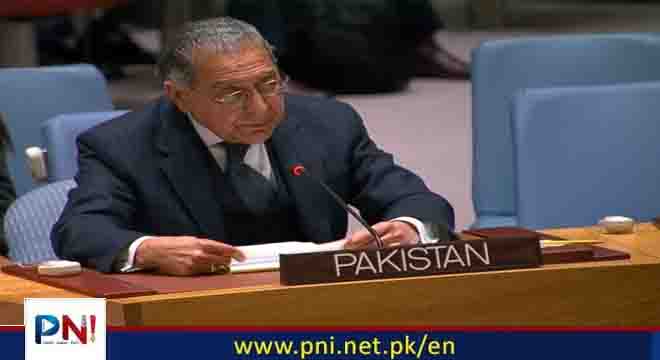NEW YORK, Aug 29 : The proliferation of global and regional conflicts like those in Gaza, Ukraine, Africa, South Asia, and the South China Sea, are stark indicators of the erosion of the international peace and security order, Pakistan’s UN Ambassador Munir Akram has said, as he voiced “deep concern” over the grave challenges confronting the world.
Speaking to a group of Fulbright scholars at the Pakistan Mission on Wednesday, he underscored the need for adhering to the principles and purposes enshrined in the UN Charter for ensuring global peace and stability, according to a mission’s press release.
However, Ambassador Akram warned that persistent violations of these principles have exposed the world to unprecedented risks, saying that the failure of the multilateral system to address these conflicts underscores the need for a renewed commitment to the core tenets of international cooperation.
The visiting Fulbright scholars belonging to different countries, including Pakistan, are studying for their Master’s and PhD degrees in different American universities.
Discussing the UN Secretary-General initiative of the Summit of the Future (SOTF), which will be held next month, Ambassador Akram said that it aims to build a new global consensus for multilateral action to tackle emerging challenges.
However, he cautioned that the UN multilateral system faces inherent structural problems, such as the use of veto power, which have hindered its ability to deliver on its mandate.
The Pakistani envoy identified a range of interconnected global challenges, including climate change, the deepening technological divide, unequal access to development finance for developing countries, and the looming threat of nuclear conflict.
He warned that these challenges are darkening the global security landscape and require immediate and coordinated
international action.
Focusing on South Asia, Ambassador Akram reiterated that the region remains a nuclear flashpoint due to the unresolved dispute over Jammu and Kashmir. He underscored the need for a just and lasting resolution to this issue to ensure regional peace and stability.
He also highlighted the devastating impact of climate change, pointing to recent disasters such as super floods, extreme heatwaves, and cyclones as evidence of the growing threat.
He noted that despite their negligible contribution to global emissions, developing countries like Pakistan are the worst affected by the consequences of climate change, which are largely driven by the actions of industrialized nations.
He called on developed countries to recognize the global nature of climate threats and to demonstrate greater political will in addressing this challenge.
The Ambassador criticized the insufficient financial commitments made by developed countries for climate adaptation and mitigation. He argued that the provision of $100 billion in funding falls far short of the $1 trillion needed to adequately deal with the crisis.
Ambassador Akram expressed concern over the rising poverty and underdevelopment in many developing countries. He revealed that approximately 150 million people have recently fallen back into poverty.
While acknowledging China’s success in lifting 800 million people out of poverty, he pointed out that other developing nations have been severely impacted by global supply chain disruptions, rising food and fuel prices, and crippling debt burdens. He emphasized that 65% of the resources in the developing world are currently spent on debt repayments, at the expense of critical development needs.
On technology, Ambassador Akram observed that while technological advancements, particularly in Artificial Intelligence (AI), are progressing at an astonishing pace, they are also exacerbating the global knowledge divide.
He warned that technology has become a new arena for competition among major powers, often to the detriment of developing nations.
In conclusion, Ambassador Akram urged the youth to engage more actively with global issues and to propose innovative solutions as they represent the future of international leadership.
He also provided the scholars with an overview of the evolution of the international system through various phases.
The session concluded with a question-and-answer session during which the scholars engaged with Ambassador Akram on a range of topics related to global peace, security, and development issues.
Follow the PNI Facebook page for the latest news and updates.









